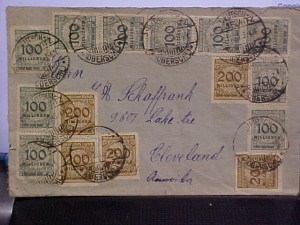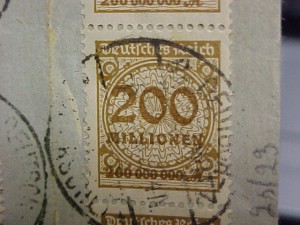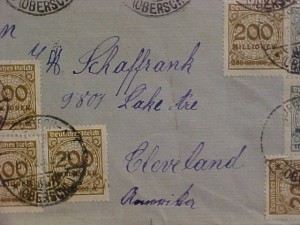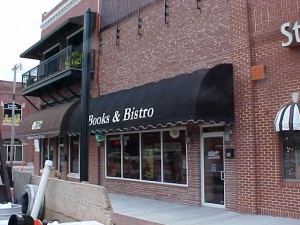Here you are at the post office, holding a letter to your relative in Cleveland. Times are tough. Crazy tough. So tough that you’ve got to write and let them know what is going on. Crazy stuff. You just need some stamps.
The clerk weighs the envelope and looks in your direction. Intense eyes. No smile.
How much, you ask.
Four.
Four dollars, you respond, while reaching for your cash.
Suddenly, the clerk laughs.
Four dollars! He repeats. What a joker! He turns to his coworker. Frank! We got a comedian here! Wants to know if four is four dollars! What a hoot! Four Dollars? Hoooo-weee!
Well, then – you ask. If not four dollars, then four what?
The clerk leans into your face and replies – without a trace of humor:
Four Billion Dollars.
Oh. Now there is a number.
How many stamps is that, you want to know.
Depends, he says. I’ve got some 200s but not enough. You’ll have to double up on the 100s. Too bad you don’t have a larger envelope, he decides.
So you buy the stamps and start licking. It’s 1923, and there aren’t any self-adhesive postage stamps. You’ll have to apply the tongue to each of the 25 stamps. You decide it was a good thing he had the 200-million stamps or you’d have had to cover up your return address on the back, where half of those postage stamps have been applied.
The War to End all Wars is over, and it’s another decade before the unrest bubbles up enough to plant the seeds of World War II. For the citizens of defeated Germany, times are tough. Today, they call it hyperinflation. Back then, there were a number of words that described the economy and the buying power of Germany cash.
None of them are printable here. Even in German. (A very linguistically literate audience haunts this blog…)
To send word across the Atlantic to the relatives in Amerika requires International Postage. The 25 stamps in 200 and 100 Million Mark (German dollar) increments amount to 4,000 million, or what we would call – with all those zeroes – four Billion.
Four Billion Dollars to send a letter.
You just wonder whether what was in the letter was worth it. The German word was millionen. Million. You can click on the image to see a view of the high-dollar stamps (actually high-Mark, their currency) that were required to simply mail a letter. If you click, you’ll also notice that – even without zipcodes or barcodes – the letter found its destination simply addressed to “Cleveland Amerika.” 1923 efficiency.
Here is the often repeated anecdote about post WWI Germany in the hyper-inflation years, of which 1923 – the year the letter in the images was written – might have been the absolute worst.
Workers who wanted to make the most of their money, demanded to be paid every few hours, so the cash could be spent before it became worthless. One employee loaded up all of his cash pay into a wheelbarrow and rushed off to the store to buy bread for his family.
He parked the wheelbarrow beside the front door and dashed inside to see if any loaves were left. When he came back out moments later, he looked at the spot where he had left the wheelbarrow. His heart sank.
The results of all his hard work were wasted, so much more than the just the morning’s pay was gone.
The thief had dumped all the money on the ground and made off with his wheelbarrow.
Another illustration of the times involved another wheelbarrow. This pile of money was being wheeled to the shoe store one Friday morning to buy a new pair of boots. If he had wheeled that same pile of money to the same store on Monday, he could have bought the entire STORE.
Always surprising, the things that show up in a book shop. Would have loved to have read the letter that it took 4-Billion Marks to mail. My guess is, by the time this piece of postage hit the mailbox, the German monetary system was just about to hit its reset button.
And the currency of record became bananas. (Kidding.)
As we all know, the new legal tender became Reuben sandwiches.
Come get one! (…without the sauerkraut. Hey, it’s Irish without inflation!)
McHuston
Booksellers & Irish Bistro
Rose District
122 South Main Street, Broken Arrow OK!





